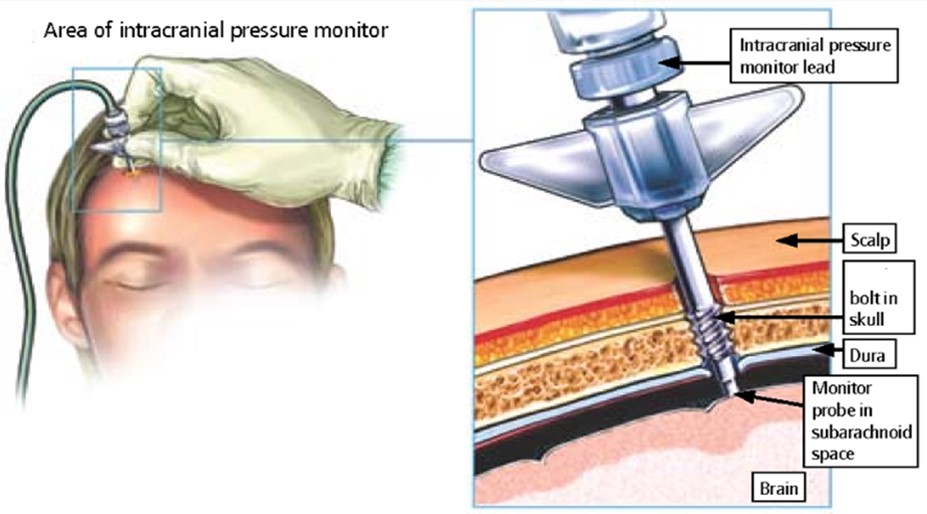Intracranial Pressure Monitoring (ICP)
What is Intracranial pressure (ICP)?
ICP is the pressure within the brain and surrounding tissues and is measured in millimetres of mercury (mmHg).
ICP monitoring involves measuring this pressure within your head using a sensor that is connected to a monitor. An ICP bolt is the sensor which is inserted through the skull and attached to the ICP monitor via a wire.
The ICP monitors have a visual screen that will give a reading which can be reviewed by your consultant’s team, these readings will then be downloaded onto a piece of software that allows us to fully interpret the results.
Why do we measure ICP?
There are different reasons why you may require this procedure. This is a diagnostic test and can help guide your consultant to consider if you require any further tests or treatment.
Your Neurosurgeon or Nurse Specialist can explain this further, explaining the reasons why this is required for your specific condition.
How long does monitoring take?
ICP monitoring will involve you staying in hospital for 48-72 hours as an inpatient.

What does the procedure involve?
You will require a surgical procedure for the ICP bolt to be inserted. The procedure is usually completed under a local anaesthetic in the operating theatre; however, this can also be completed under a general anaesthetic in some circumstances.
Your neurosurgeon will drill a small hole into your skull, usually to the right side. The ICP bolt is inserted through the drilled hole and a wire is passed a few millimetres under the brain tissue surface.
This probe will be kept in place for up to 72 hours.
Are there any risks to the procedure?
ICP monitoring is invasive surgery and does come with some risks which include:
- Risk of infection
- Risk of bleeding
- Risk of seizure
- Risk of blood clot developing around the monitoring wire
- Risk of air around the monitoring wire which may cause an increase in headache.
- Risk of reaction to the local/general anaesthetic
- Risk of the monitoring wire needing to be replaced.
Consent
As with any surgical procedure you will be consented by your Neurosurgeon. They will explain the procedure, associated risks, and benefits of ICP monitoring. This also allows you time to ask them any questions to discuss any concerns or queries you may have.
Preparation before your admission date
Before you come into hospital for your procedure you will be seen in the outpatient department for a pre-operative assessment. During your pre-operative assessment, the nurse will take all your medical history, history of your symptoms, list of medications and discuss the proposed procedure. The nurse will assess whether you are fit for surgery, and you will have routine bloods, MRSA swabs and any other investigations which may be required.
You will also be called by a Hydrocephalus Nurse Specialist who can answer any specific questions you may have regarding your procedure or your recovery.
ICP Results and what do they mean?
Once your period of ICP monitoring is complete the results will be downloaded onto a piece of computer software. This allows your Neurosurgeon and Nurse Specialist to view and interpret your ICP readings. When reviewing your ICP readings we look at the pattern of your ICP as well as the numbers and your symptoms.
It is advisable that you keep a diary or record of your symptoms during the procedure, documenting any periods where you have an increase in your symptoms noting down the time. This can help us compare this to your ICP reading trace.
Will this procedure be painful?
You should only experience minimal pain from this procedure and pain relief can be obtained by the ward nursing staff caring for you. This pain is often from the wound site.
How is the bolt/wire removed?
The bolt/wire will be removed on the ward by either a doctor or a Hydrocephalus Nurse Specialist. The entry site of the bolt will require one stitch, and this will be removed by your GP or local walk-in centre after 7 days.
Can I still drive?
Yes, the DVLA does not class this surgery as a risk to driving.
You are able to return to driving when you feel able and can complete an emergency stop safely.
On discharge are there any signs and symptoms I need to report?
You should contact the Hydrocephalus Nurse Specialist if you experience any of the following:
- Severe headaches or vomiting.
- Temperature over 38°C
- Any discharge from the wound or if you feel the wound is red/hot to touch/swollen.
Who do I contact in relation to concerns?
The Hydrocephalus Nurse Specialist Teams’ working hours are:
08.30-17.00
They are available via the hospital switchboard 0151 525 3611 and ask for Bleep 5340
If out of hours:
Contact the ward from which you were discharged or if acutely unwell attend Accident and Emergency (A&E) department at your local hospital.
- Last Updated:01 July 2023
- Review Date:01 July 2025
- Author:Louise Wainwright
- Summary:
ICP is the pressure within the brain and surrounding tissues and is measured in millimetres of mercury (mmHg).